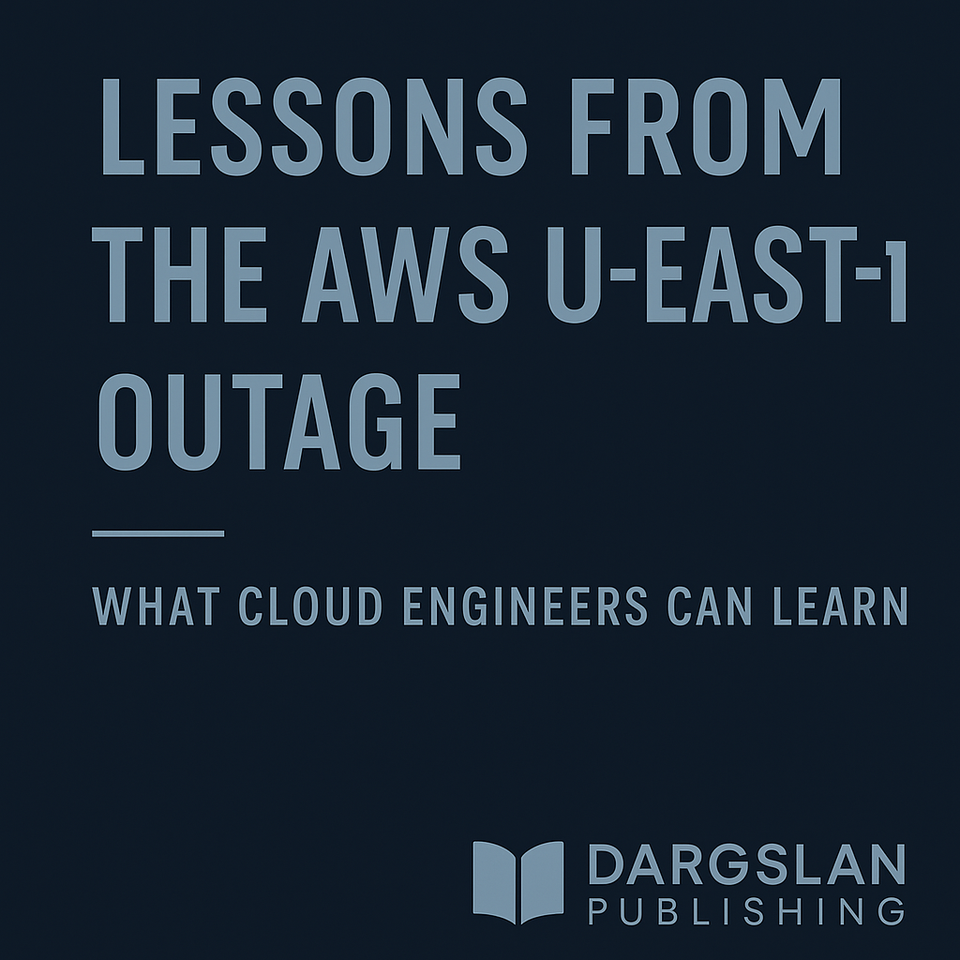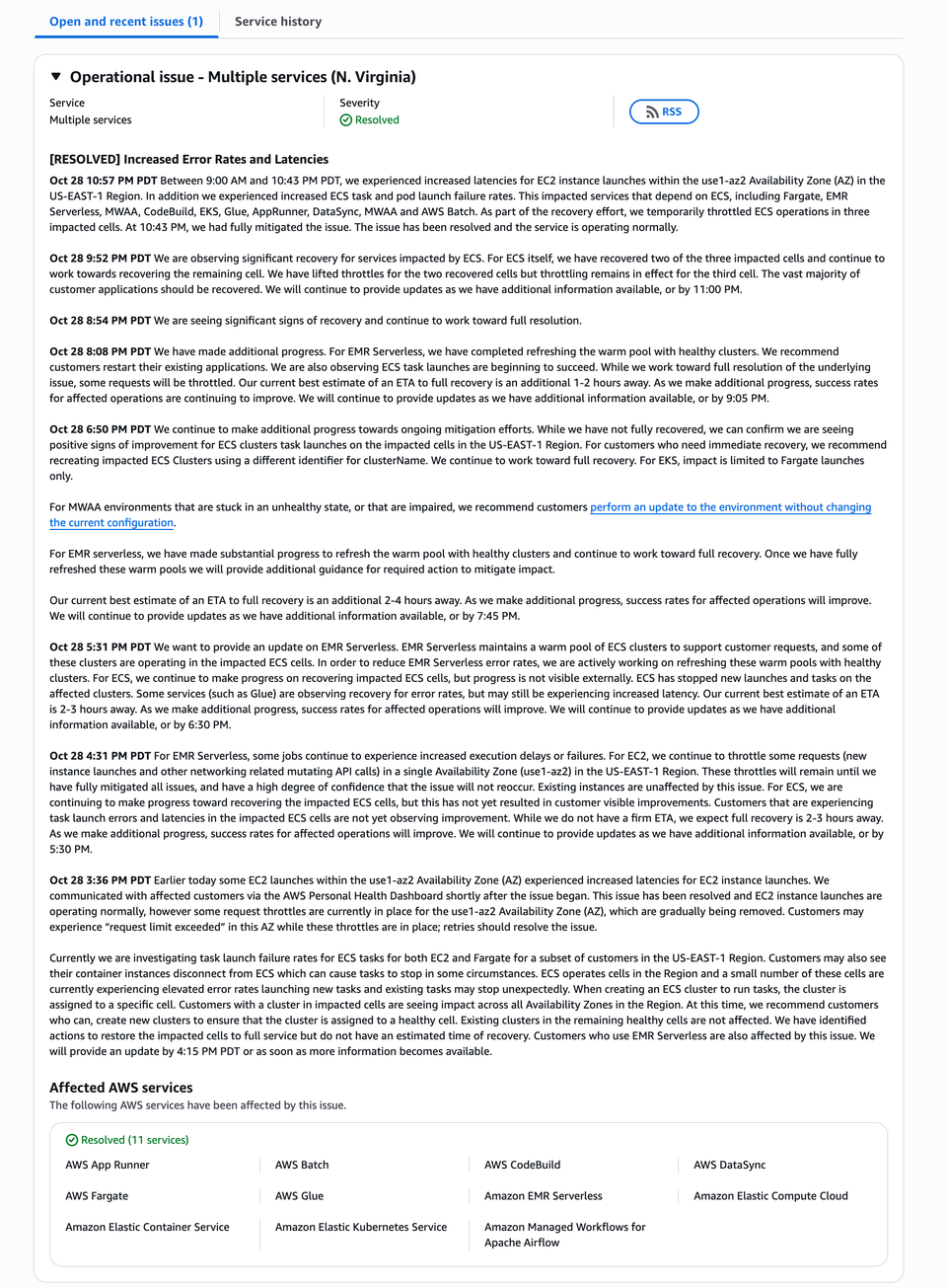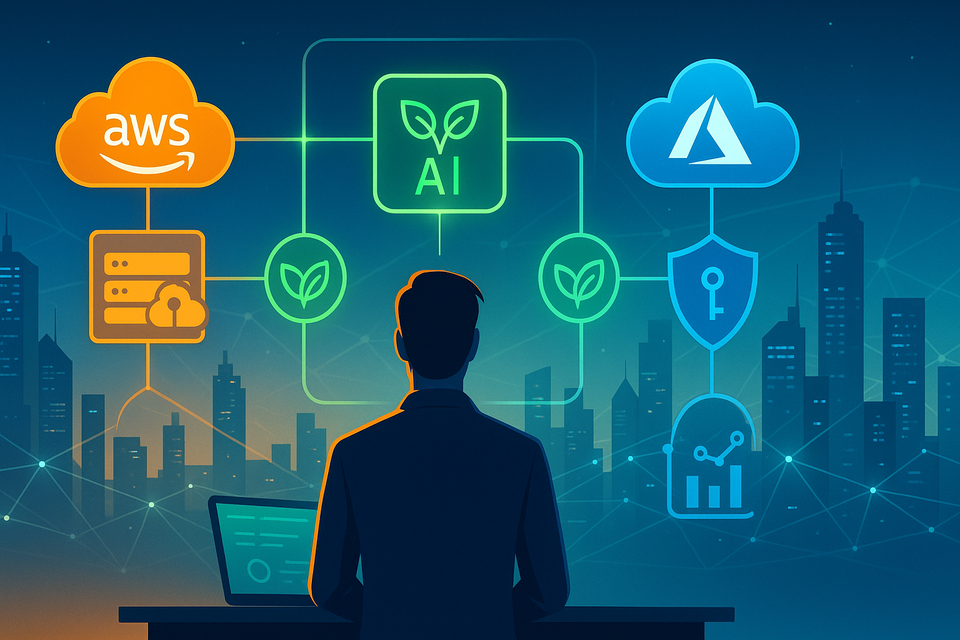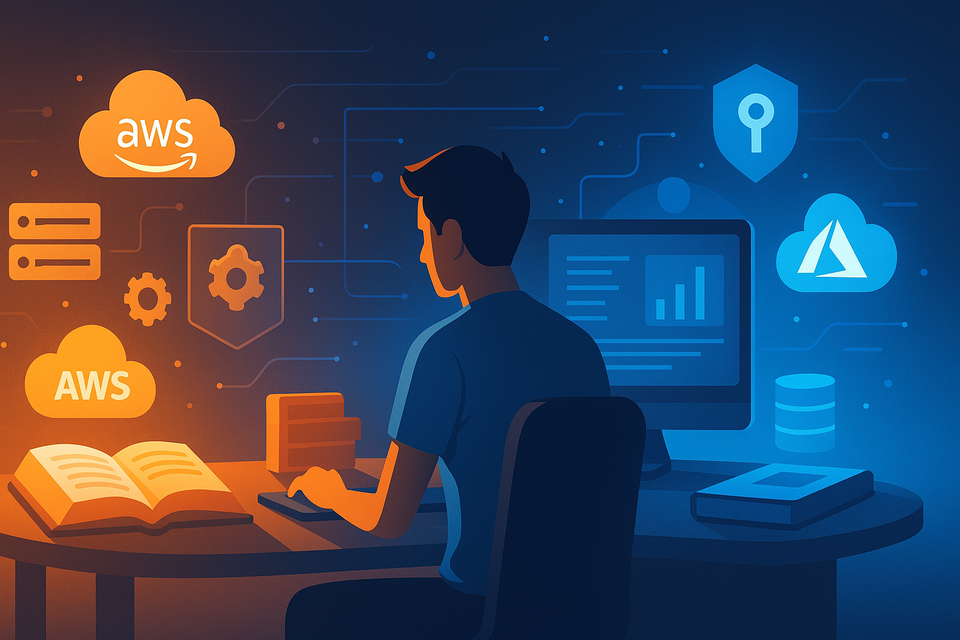AWS vs Microsoft Certifications in 2025
In 2025, the demand for certified cloud professionals continues to surge. Amazon Web Services (AWS) and Microsoft remain two of the biggest players in the cloud industry — each offering a robust certification ecosystem designed to validate your technical expertise and boost your career potential.
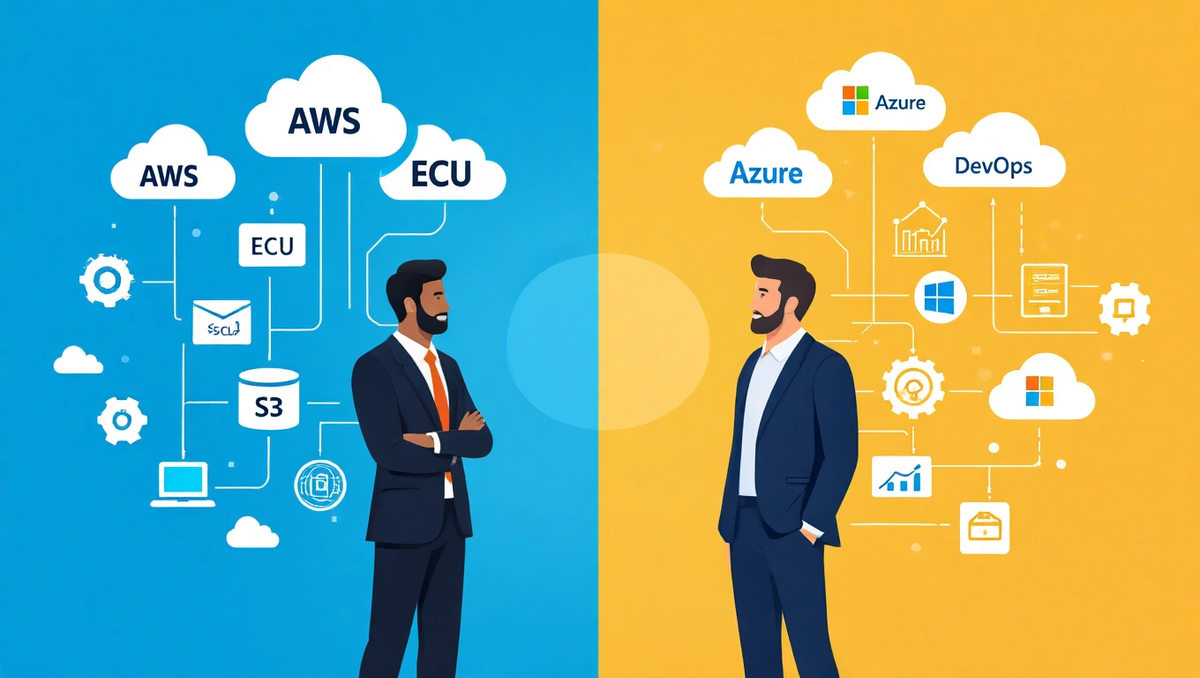
Which Cloud Path Should You Choose for Your Career?
In 2025, the demand for certified cloud professionals continues to surge. Amazon Web Services (AWS) and Microsoft remain two of the biggest players in the cloud industry — each offering a robust certification ecosystem designed to validate your technical expertise and boost your career potential. This in-depth comparison explores their structure, costs, difficulty, real-world value, and how to decide which certification path fits your career goals.
1. The Rise of Cloud Certifications
Cloud computing has transformed how businesses operate. Organizations rely on certified professionals to build, secure, and maintain cloud infrastructure efficiently. As more companies migrate to the cloud, certifications have become career currency.
AWS and Microsoft certifications are more than technical badges — they represent proof of applied skills, commitment to learning, and readiness for real-world challenges.
In 2025, employers no longer ask “Do you know cloud?” — they ask, “Are you certified?”
2. AWS Certification Path Overview
AWS (Amazon Web Services) certifications are globally recognized as some of the most respected credentials in the tech industry. They validate hands-on experience in designing, deploying, and managing scalable cloud systems.
AWS Certification Levels
| Level | Description | Example Certifications | Recommended Experience |
|---|---|---|---|
| Foundational | Entry-level; basic understanding of cloud concepts and AWS services. | AWS Certified Cloud Practitioner | 6 months of general cloud knowledge |
| Associate | Intermediate; focuses on specific roles and deeper AWS knowledge. | AWS Certified Solutions Architect – Associate, Developer – Associate, SysOps Administrator – Associate | 1 year of AWS experience |
| Professional | Advanced; for senior cloud engineers and architects. | AWS Certified Solutions Architect – Professional, DevOps Engineer – Professional | 2+ years of AWS experience |
| Specialty | Expert-level; focuses on specific technical domains. | Security, Networking, Machine Learning, Data Analytics, Database, SAP | Deep expertise in chosen domain |
Key Features of AWS Certifications
- Vendor-specific: Entirely AWS-focused, covering over 200 services.
- Hands-on orientation: Real scenarios tested through complex, case-based questions.
- Valid for 3 years: Renewal ensures up-to-date knowledge with AWS service changes.
- Global recognition: Considered the gold standard for cloud professionals.
AWS exams are designed for technical professionals — they emphasize architecture, automation, cost optimization, and cloud security.
3. Microsoft Certification Path Overview
Microsoft Certifications follow a role-based model introduced with Azure. Instead of a purely hierarchical system, certifications are mapped to job roles like administrator, developer, data engineer, or security specialist.
Microsoft Certification Levels
| Level | Description | Example Certifications | Recommended Experience |
|---|---|---|---|
| Fundamentals | Entry-level; verifies understanding of Microsoft Azure and cloud concepts. | Microsoft Certified: Azure Fundamentals (AZ-900) | No prior experience required |
| Associate | Mid-level; validates skills in deploying, managing, and developing Azure solutions. | Azure Administrator Associate (AZ-104), Azure Developer Associate (AZ-204) | 1–2 years of Azure experience |
| Expert | Advanced; tests architecture and cross-platform cloud solutions. | Azure Solutions Architect Expert (AZ-305), DevOps Engineer Expert (AZ-400) | 2+ years hands-on Azure experience |
| Specialty | Deep specialization in specific Microsoft technologies. | Security Engineer, AI Engineer, IoT Developer, Data Scientist | Expert-level domain knowledge |
Key Features of Microsoft Certifications
- Role-oriented: Built for specific professional roles.
- Integrated ecosystem: Covers Azure, Microsoft 365, Power Platform, and Dynamics 365.
- Annual renewal: Certifications must be renewed online every 12 months.
- Strong enterprise relevance: Especially valuable for organizations running Microsoft environments.
Microsoft certifications validate both cloud and hybrid-environment expertise, making them ideal for enterprises using a mix of on-premises and cloud infrastructure.
4. AWS vs Microsoft: A Complete Comparison
| Category | AWS Certifications | Microsoft Certifications (Azure) |
|---|---|---|
| Cloud Market Share (2025) | Around 31–33% (leader) | Around 25–28% (rapidly growing) |
| Learning Focus | Deep dive into AWS architecture, automation, and cost control | Broader ecosystem — Azure, M365, Security, AI, DevOps |
| Certification Model | Hierarchical (Foundational → Specialty) | Role-based (Fundamentals → Expert) |
| Best For | Cloud engineers, DevOps specialists, solution architects | Azure admins, developers, data engineers, security experts |
| Exam Renewal | Every 3 years | Every 1 year (renew online for free) |
| Exam Difficulty | High — technical and scenario-driven | Moderate to high — strong focus on applied Azure skills |
| Hands-on Labs | Recommended and widely available | Integrated into Microsoft Learn modules |
| Cost Range | $100–$300 per exam | $99–$165 per exam |
| Global Demand | Extremely high (especially in startups and AWS-based firms) | High (especially in enterprise environments) |
| Career Impact | Recognized worldwide as a top cloud credential | Strong enterprise and hybrid-cloud reputation |
5. Exam Format and Structure
AWS Exams
- Multiple-choice and multiple-response questions.
- Timed (usually 130 minutes).
- Typically conducted via Pearson VUE or PSI.
- Scenario-based: you must understand architecture trade-offs and implementation details.
- Difficulty: 7.5/10 average (Professional exams can reach 9/10).
Microsoft Exams
- Multiple-choice, drag-and-drop, and case study questions.
- Online or in-person delivery via Pearson VUE.
- Role-based questions; less architecture focus, more task-based problem solving.
- Difficulty: 6/10 average (Expert exams up to 8/10).
6. Salary Impact and Career Value
| Role | Average Annual Salary (2025) | With AWS Certification | With Microsoft Certification |
|---|---|---|---|
| Cloud Architect | $120,000 – $160,000 | +20% average increase | +18% average increase |
| DevOps Engineer | $100,000 – $145,000 | +22% | +19% |
| Cloud Administrator | $80,000 – $110,000 | +15% | +17% |
| Data Engineer | $95,000 – $130,000 | +17% | +20% |
| Security Engineer | $100,000 – $140,000 | +18% | +21% |
Insight:
Both certifications provide a measurable salary advantage. However, Microsoft certifications often lead to faster advancement in enterprise-level roles, while AWS certifications remain more dominant in the startup, DevOps, and infrastructure-focused markets.
7. Which Is Easier to Get?
It depends on your background:
- AWS exams are more architecture-heavy and expect deep understanding of networking, IAM, and automation tools (CloudFormation, ECS, Lambda).
- Microsoft exams are more structured and guided; Azure’s integrated ecosystem makes learning smoother for beginners.
If you come from a Windows, .NET, or Office 365 background, Azure is easier to transition into.
If you’re already comfortable with Linux, networking, or DevOps tools, AWS will feel more natural.
8. Learning Resources and Preparation
| Platform | AWS Learning Path | Microsoft Learning Path |
|---|---|---|
| Official Portal | AWS Skill Builder (free + paid labs) | Microsoft Learn (free modules and guided paths) |
| Hands-on Practice | AWS Free Tier – 12 months | Azure Sandbox – temporary free resources |
| Study Duration (avg.) | 80–120 hours per exam | 60–100 hours per exam |
| Community Support | Large Reddit and Discord communities | Strong LinkedIn and Tech Community presence |
| Preparation Strategy | Focus on service interconnections, IAM, networking, and automation | Focus on Azure Resource Manager, security, and identity services |
A practical approach combines theory, hands-on labs, and mock exams.
Both AWS and Microsoft now offer practice labs directly in their learning platforms, allowing candidates to simulate real cloud deployments before testing.
9. The Certification Ecosystem (2025 Update)
AWS Highlights
- Growing emphasis on AI, machine learning, and data engineering.
- New Specialty certifications for Generative AI and Security Operations.
- More regional testing centers and remote exam flexibility.
- Increased employer demand across startups and enterprise DevOps teams.
Microsoft Highlights
- Expanded focus on AI-900 (Azure AI Fundamentals) and Cybersecurity certifications.
- Integration with Copilot and Power Platform technologies.
- Certifications now connect with LinkedIn Skills Badges, adding visibility for recruiters.
- Free annual renewal tests keep credentials accessible and affordable.
10. Practical Use Cases: When to Choose Which
| Career Goal | Recommended Path | Reason |
|---|---|---|
| You want to design scalable cloud systems and work in global tech firms. | AWS Solutions Architect Path | Strong architectural and automation emphasis. |
| You’re part of a Microsoft 365 or Azure-based company. | Microsoft Azure Path | Seamless integration with enterprise tools. |
| You’re aiming for DevOps or CI/CD roles. | AWS DevOps Engineer or Azure DevOps Expert | Both are strong, AWS slightly more infrastructure-centric. |
| You’re moving toward AI or ML engineering. | AWS Machine Learning Specialty | Deeper technical model training environment. |
| You want to manage hybrid cloud and on-premises systems. | Microsoft Azure Administrator or Hybrid Specialist | Ideal for enterprises using hybrid setups. |
11. Long-Term Career Growth
Both AWS and Microsoft certifications open multiple doors beyond traditional IT roles. Certified professionals can transition into:
- Cloud Architects designing complex multi-cloud environments.
- DevOps Engineers automating continuous delivery pipelines.
- Security Specialists protecting cloud workloads.
- AI Engineers integrating machine learning into business applications.
- Consultants and Trainers guiding organizations through migration and optimization.
The best professionals often hold both AWS and Microsoft certifications, leveraging a multi-cloud approach for career flexibility.
12. Renewal and Maintenance
| Aspect | AWS | Microsoft |
|---|---|---|
| Validity Period | 3 years | 1 year |
| Renewal Method | Retake exam or earn Continuing Education credits | Online renewal assessment (free) |
| Cost to Renew | Standard exam price | Free online |
| Ease of Renewal | Moderate – must re-schedule exam | Easy – self-paced renewal quiz |
| Tracking Progress | AWS Certification Portal | Microsoft Learn Dashboard |
AWS renewals ensure deep technical continuity, while Microsoft’s renewal model keeps professionals engaged yearly through continuous learning.
13. Key Differences Summarized
| Feature | AWS Certifications | Microsoft Certifications |
|---|---|---|
| Orientation | Platform-centric (AWS services) | Role-centric (job functions) |
| Ecosystem | AWS Cloud, Lambda, EC2, S3, VPC | Azure, M365, Power Platform, Dynamics |
| Exam Renewal | Every 3 years | Every 1 year |
| Target Users | Architects, Developers, Cloud Ops | Administrators, Data, AI, Security Pros |
| Market Trend | Dominant in startups & DevOps | Dominant in enterprises & hybrid IT |
| Learning Path | Hierarchical and service-based | Role-based and modular |
| Cost Range | $100–$300 | $99–$165 |
| Difficulty | Higher at Professional level | Moderate overall |
| Badge Recognition | Digital AWS Badge (Credly) | Microsoft Badge (LinkedIn + Learn) |
| Cross-Platform Value | High for AWS-heavy stacks | High for Microsoft-based systems |
14. Pros and Cons
AWS Certifications
Pros:
- Highest global recognition in cloud computing.
- Comprehensive coverage of infrastructure services.
- Valuable for DevOps, automation, and architecture roles.
- Strong community and learning resources.
Cons:
- Exams can be very challenging.
- Renewal costs every 3 years.
- Limited direct crossover to non-AWS environments.
Microsoft Certifications
Pros:
- Easier learning curve for enterprise professionals.
- Covers multiple business and security domains.
- Annual free renewals.
- Tight integration with Microsoft products.
Cons:
- Azure market share still smaller than AWS globally.
- Exams can feel fragmented due to frequent updates.
- Less Linux-oriented, more Windows-centric.
15. The Multi-Cloud Advantage
In 2025, hybrid and multi-cloud strategies dominate IT infrastructure.
Professionals with both AWS and Microsoft certifications stand out — they can design, manage, and secure environments that leverage the best of both worlds.
For example:
- Use AWS for global scale and compute efficiency.
- Use Azure for enterprise security, compliance, and integration.
Being multi-certified doesn’t just make you more employable — it makes you indispensable.
16. Final Recommendation
- Start with your current environment.
If your company runs mostly Microsoft tools, start with Azure Fundamentals.
If you work with open-source stacks or Linux, start with AWS Cloud Practitioner. - Move from foundational to specialized.
Build your path progressively: Foundational → Associate → Expert/Specialty. - Stay updated.
Cloud evolves monthly — continuous learning is part of the job. - Share your achievements.
Display your badges on LinkedIn, portfolios, and resumes. Certifications only shine when seen. - Think multi-cloud.
AWS + Microsoft = ultimate cloud career resilience.
17. Conclusion
AWS and Microsoft certifications are not just credentials — they are career accelerators.
Both open the door to high-paying roles in cloud architecture, DevOps, data, and AI.
The choice between AWS and Microsoft depends on your goals, environment, and career trajectory.
For deep technical engineering and infrastructure roles, AWS is unbeatable.
For enterprise, hybrid, and business-integrated roles, Microsoft Azure leads the way.
In the end, the smartest professionals in 2025 embrace both — combining AWS innovation with Microsoft’s enterprise power.
Continue learning, earning, and sharing your knowledge. For more in-depth technology guides and certification strategies, visit dargslan.com — your hub for professional IT growth and cloud mastery.
#AWS #Azure #CloudComputing #Certification #DevOps #ITCareers #Microsoft #AmazonWebServices #CloudCertification #TechEducation
AWS vs Microsoft Certifications – FAQ (2025 Edition)
1. What is the main difference between AWS and Microsoft certifications?
The main difference lies in their structure and focus.
AWS certifications are platform-based, concentrating entirely on AWS technologies, architecture, and automation.
Microsoft certifications, on the other hand, are role-based, focusing on practical job roles such as Administrator, Developer, or Security Engineer within the Microsoft ecosystem.
2. Which certification is more valuable in 2025: AWS or Microsoft?
Both are valuable — but for different reasons.
- AWS remains the global leader in cloud infrastructure, making it ideal for cloud architects, DevOps engineers, and system administrators.
- Microsoft certifications are more valuable for professionals working in enterprise environments or hybrid setups that combine cloud and on-premises systems.
If you aim for global startups or scalable architectures → choose AWS.
If you work in large corporations using Azure and Microsoft 365 → choose Microsoft.
3. How long does it take to prepare for an AWS certification?
Preparation time varies depending on experience:
- Foundational: 2–4 weeks (40–60 hours)
- Associate: 6–8 weeks (80–120 hours)
- Professional: 10–12 weeks (150+ hours)
- Specialty: 12–16 weeks depending on the domain
Hands-on experience is essential — studying alone is not enough for AWS exams.
4. How long does it take to prepare for a Microsoft certification?
On average:
- Fundamentals: 2–3 weeks
- Associate: 6–8 weeks
- Expert or Specialty: 8–12 weeks
Because Microsoft Learn offers structured modules and sandbox labs, preparation can be more guided and time-efficient than AWS self-study paths.
5. Are AWS exams harder than Microsoft exams?
Generally, yes. AWS exams tend to be more complex and scenario-based, requiring a deep understanding of architecture, networking, and automation.
Microsoft exams are more structured and role-specific, focusing on practical, task-oriented skills in Azure environments.
6. What are the costs of AWS and Microsoft exams in 2025?
| Level | AWS (USD) | Microsoft (USD) |
|---|---|---|
| Entry / Fundamentals | $100 | $99 |
| Associate / Intermediate | $150 | $165 |
| Professional / Expert | $300 | $165–$200 |
| Specialty | $300 | $165–$200 |
Prices vary by country, testing center, and currency exchange rate.
7. How long are the certifications valid?
- AWS Certifications: Valid for 3 years. Renewal requires retaking the exam or earning Continuing Education credits.
- Microsoft Certifications: Valid for 1 year, but renewal is free through an online assessment.
8. Can I take the exams online from home?
Yes. Both AWS and Microsoft offer online proctored exams via Pearson VUE.
You’ll need a quiet environment, a webcam, stable internet, and valid identification. Remote proctoring has become standard since 2023.
9. Which certification pays more?
While salaries vary by role and region, AWS certifications often lead to slightly higher pay.
- AWS Certified Solutions Architect – Professional: up to $150,000/year.
- Microsoft Certified Azure Solutions Architect Expert: around $140,000/year.
However, combined certifications (AWS + Microsoft) can yield the highest salaries, as multi-cloud expertise is highly sought after.
10. Which certification should beginners start with?
For absolute beginners:
- AWS: Start with AWS Certified Cloud Practitioner.
- Microsoft: Start with Azure Fundamentals (AZ-900).
Both certifications provide a strong foundation and do not require technical experience. They introduce cloud principles, billing, compliance, and basic services.
11. Are there free training resources available?
Yes, plenty:
- AWS Skill Builder – free official training platform with labs and learning paths.
- Microsoft Learn – free, interactive learning environment with hands-on modules and sandbox access.
- YouTube, GitHub, and community blogs also offer tutorials and mock exams.
Paid resources such as Udemy, A Cloud Guru, and Pluralsight can also accelerate preparation.
12. Do AWS and Microsoft certifications expire automatically?
Yes. After the validity period (3 years for AWS, 1 year for Microsoft), your certification status changes to “expired” unless renewed.
Expired certifications still show in your history but are not considered active credentials.
13. Is it worth getting both AWS and Microsoft certifications?
Absolutely. Multi-cloud knowledge is one of the most valuable skill sets in 2025.
Many companies use AWS for compute and AI and Azure for identity and hybrid solutions.
Holding both certifications demonstrates flexibility and adaptability — essential qualities for cloud engineers, architects, and consultants.
14. Which certification path is best for DevOps engineers?
For DevOps professionals, both ecosystems have specialized paths:
- AWS: AWS Certified DevOps Engineer – Professional
- Microsoft: Azure DevOps Engineer Expert (AZ-400)
Both focus on CI/CD pipelines, infrastructure automation, and monitoring. AWS emphasizes infrastructure as code, while Microsoft focuses on integration with GitHub and Azure DevOps services.
15. What are the most popular AWS certifications in 2025?
- AWS Certified Solutions Architect – Associate
- AWS Certified Developer – Associate
- AWS Certified Solutions Architect – Professional
- AWS Certified Security – Specialty
- AWS Certified Machine Learning – Specialty
These are in highest demand among employers globally.
16. What are the most popular Microsoft certifications in 2025?
- Azure Fundamentals (AZ-900)
- Azure Administrator Associate (AZ-104)
- Azure Solutions Architect Expert (AZ-305)
- Azure Security Engineer Associate (AZ-500)
- Azure AI Engineer Associate (AI-102)
AI and Security certifications have grown rapidly due to the integration of Microsoft Copilot and AI-based cloud features.
17. Do employers really care about certifications?
Yes — and increasingly so. Certifications provide objective validation of your skills, saving employers time during hiring.
Many recruiters filter candidates using certification keywords such as AWS Certified or Azure Certified.
They also show commitment to continuous learning, which is crucial in cloud roles that evolve monthly.
18. Can I pass without hands-on experience?
While technically possible for the foundational exams, it’s not recommended.
AWS and Microsoft tests are scenario-driven; they expect you to understand real-world cloud configurations.
Hands-on labs, even through free tiers or sandboxes, make a huge difference in understanding service behavior and limitations.
19. How can I renew my certifications easily?
- AWS: Retake the same or higher-level exam before expiration. You can also maintain active status through AWS Partner Continuing Education credits.
- Microsoft: Log into Microsoft Learn, complete the free renewal module, and pass the short knowledge check. Renewal takes about 20–30 minutes and updates your certificate instantly.
20. What’s the future of cloud certifications beyond 2025?
The trend is moving toward AI-powered certifications and micro-credentials.
Both AWS and Microsoft are integrating Generative AI, Machine Learning, and Cybersecurity into new certification tracks.
By 2026, expect to see titles like AWS Certified AI Engineer or Microsoft Certified Copilot Specialist.
Cloud certifications are evolving into lifelong learning frameworks, ensuring professionals stay relevant in an AI-driven world.
✅ Bonus Tip: How to Choose the Right Path
If you’re still unsure:
- Choose AWS if you prefer infrastructure, automation, and global scalability.
- Choose Microsoft if you prefer enterprise systems, identity management, and business solutions.
- Choose both if you want to future-proof your cloud career.
✨ Final Words
Cloud certifications are not just exams — they are career investments.
Whether you pick AWS, Microsoft, or both, consistent learning, hands-on experience, and curiosity will define your success in the fast-changing world of cloud computing.
#AWS #Azure #CloudComputing #Certifications #CareerGrowth #Microsoft #AmazonWebServices #ITCareers #DevOps #CloudEngineer

